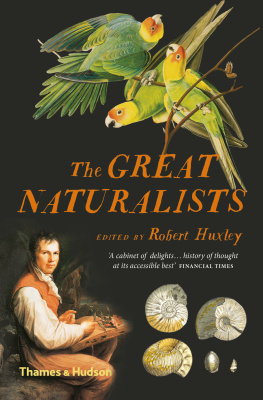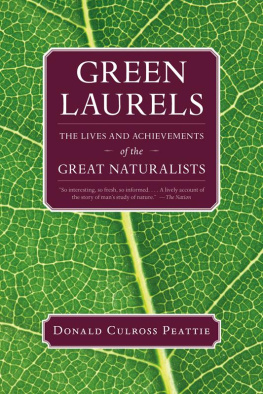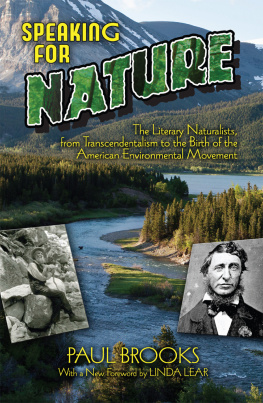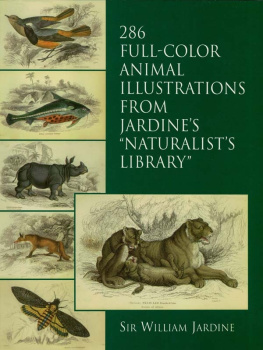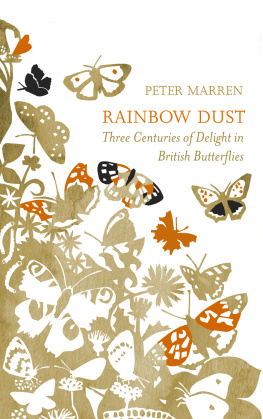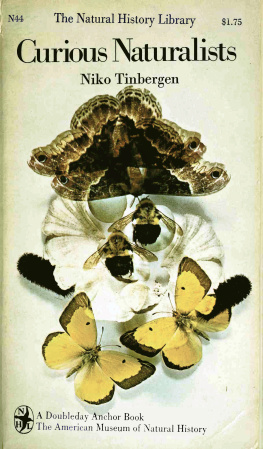Robert Huxley - The Great Naturalists
Here you can read online Robert Huxley - The Great Naturalists full text of the book (entire story) in english for free. Download pdf and epub, get meaning, cover and reviews about this ebook. year: 2007, publisher: Thames & Hudson, genre: History. Description of the work, (preface) as well as reviews are available. Best literature library LitArk.com created for fans of good reading and offers a wide selection of genres:
Romance novel
Science fiction
Adventure
Detective
Science
History
Home and family
Prose
Art
Politics
Computer
Non-fiction
Religion
Business
Children
Humor
Choose a favorite category and find really read worthwhile books. Enjoy immersion in the world of imagination, feel the emotions of the characters or learn something new for yourself, make an fascinating discovery.
- Book:The Great Naturalists
- Author:
- Publisher:Thames & Hudson
- Genre:
- Year:2007
- Rating:4 / 5
- Favourites:Add to favourites
- Your mark:
- 80
- 1
- 2
- 3
- 4
- 5
The Great Naturalists: summary, description and annotation
We offer to read an annotation, description, summary or preface (depends on what the author of the book "The Great Naturalists" wrote himself). If you haven't found the necessary information about the book — write in the comments, we will try to find it.
The Great Naturalists — read online for free the complete book (whole text) full work
Below is the text of the book, divided by pages. System saving the place of the last page read, allows you to conveniently read the book "The Great Naturalists" online for free, without having to search again every time where you left off. Put a bookmark, and you can go to the page where you finished reading at any time.
Font size:
Interval:
Bookmark:



Robert Huxley is a retired Principle Curator and Research Associate at the Natural History Museum, London where he was responsible for the botanical collections including the 17th and 18th century collections of Sir Hans Sloane. Robert now lives in Liverpool where he is a museums and heritage consultant and writer on the history of natural history and collections. He is a member of the editorial boards of Natural Science Collections and the Journal of the History of Collections.
Thames & Hudson include:
Explorers Sketchbooks
Great Explorers
Remarkable Trees
See our websites
www.thamesandhudson.com
www.thamesandhudsonusa.com
JULIA BRITTAIN
CHRISTOPHER J. HUMPHRIES & DAVID SUTTON
DAVID SUTTON
DAVID SUTTON
BRIAN W. OGILVIE
GIUSEPPE OLMI
ROBERT HUXLEY & CHRISTOPHER J. HUMPHRIES
ALAN CUTLER
SACHIKO KUSUKAWA
ALAN CUTLER
ROBERT HUXLEY
BRIAN J. FORD
BRIAN J. FORD
ROBERT HUXLEY
H. WALTER LACK
STEVE CAFFERTY
CHRISTOPHER J. HUMPHRIES & ROBERT HUXLEY
SANDRA KNAPP
ROBERT PRESS
DENIS LAMY
ROBERT PRESS
JUDITH MAGEE
TANIA DURT
R. I. VANE-WRIGHT
JILL COOK
SANDRA KNAPP
DENIS LAMY
PHILIPPE TAQUET
JOHN L. MORTON
JUDITH MAGEE
ROBERTA J. M. OLSON
JILL COOK
JILL COOK
CRISPIN TICKELL
DAVID WILLIAMS
DAVID WILLIAMS
KEITH THOMSON
SANDRA KNAPP
SANDRA KNAPP
Unity in diversity, and of connection, resemblance and order, among created things most dissimilar in their form, one fair harmonious whole
Alexander von Humboldt, Kosmos, 184562
WALKING THROUGH one of the worlds great natural history museums today, the visitor marvels at the fossilized skeletons of giant reptiles, the iridescent wings of pinioned butterflies or the elegantly displayed gems and minerals. Some of those who are intrigued and absorbed by the specimens on view will know that they are just the tip of a vast iceberg of millions and millions of others stored in ranks of cupboards and ladders of drawers and shelves behind the scenes. Fewer, perhaps, will be aware of the fact that these collections represent the results of activity reaching back into the ancient civilizations of Greece and Rome and even beyond. They are the fruits of a phenomenal human endeavour that continues to this day, as an international army of scientists struggles to name, describe, classify and understand new discoveries, in what has become a rapidly changing environment. Modern natural science was built on the work of those who went before, who braved dangers from tempests and pirates to disease and political upheavals in their pursuit of cataloguing and understanding the natural world these are the great naturalists.
What differentiates these people from modern scientists, and why do we begin a book devoted to them with Aristotle and end it in the age of Charles Darwin? To begin at the end, Darwin symbolizes a time when science changed from a broad-based and mainly amateur pursuit to the highly specialized profession that we know today a consequence in part of the huge increase in information concerning the natural world that resulted from European expansion overseas, as well as the development of essential tools such as the microscope. By the 19th century the scope of natural history had become so vast that private funding and amateur enthusiasms alone could not adequately quantify and encompass it. The scale of the challenge drove specialization, and the natural historian was replaced by the professional biologist and geologist, who then specialized further into geneticists, biochemists and systematists, for example, and then again into even more focused disciplines.
Unashamedly in this book, natural history is confined mainly to the history of the discovery, description, classification and understanding of whole organisms. Those whose main interests were in the details of the inner workings of living things or specific geological processes are generally not included, except where their studies had broader significance; hence pioneering work such as William Harveys descriptions of blood circulation or Louis Pasteurs microbiological experiments do not fall within our definition.
Since humans are themselves an inseparable element of the natural world it is inevitable that its study will always have been of great interest to us from the earliest times. Pre-literate cultures since the dawn of humanity would have needed to classify plants into those that were edible, poisonous or of medicinal value, and to recognize animals as potentially dangerous or valuable. The precise reasons for studying and understanding the natural world have changed over the centuries but, as with all human endeavours, the progress of this branch of science has been influenced by those constant factors that affect human beings. Religion and politics all play a part in the stories that follow, as do economic forces, superstition and war.
Evidence of a formal and more specialized interest in natural history came with the Sumerians in the 3rd millennium BC; they were literate and practised medicine, and recorded much of their lore. Herbal remedies were common, as was knowledge of minerals and their compounds, including iron, copper and mercury. The ancient Egyptians had a precise understanding of the Nile and its cycles, and their importance to agriculture, and they discovered much about anatomy and the preservation of organic materials through their mummification rituals. This knowledge was almost entirely empirical that is, based on perception alone. The questions Why? and How? were not and perhaps could not be asked, since any development of science as such was hindered by the power of priests, who jealously guarded knowledge.
The beginning of what we might now regard as natural science appeared with the Classical Greeks. It is remarkable how, without access to the body of knowledge that we have inherited, and given their limited accomplishment in scientific theories and the methods of experiment that we use today, they arrived at conclusions not far from those we now accept as safe. Much of Greek thought was concerned with the fundamental unchanging elements which made up the universe earth, air, fire and water. The different schools of thought considered which of these was dominant, how they affected the working of the everyday world, and whether there was a fixed universe or an ever-changing one. It was in these times that the first attempts to describe and document the natural world were made, and, more significantly to this discussion, when the first endeavours to classify living things by their morphology rather than their practical uses emerged.
And so we begin with Aristotle as the first great naturalist. Aristotle stands out among others of his time for the scale and breadth of his study, and, more importantly, the lasting legacy of his work and its significance in the development of natural science. The great philosopher, among his many interests, collected together existing descriptions of the plants and animals of his Mediterranean world, which he compiled in his great work, the
Next pageFont size:
Interval:
Bookmark:
Similar books «The Great Naturalists»
Look at similar books to The Great Naturalists. We have selected literature similar in name and meaning in the hope of providing readers with more options to find new, interesting, not yet read works.
Discussion, reviews of the book The Great Naturalists and just readers' own opinions. Leave your comments, write what you think about the work, its meaning or the main characters. Specify what exactly you liked and what you didn't like, and why you think so.

